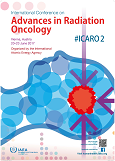Speaker
David Jaffray
(University Health Network)
Description
Many low-to-middle income countries (LMICs) suffer from a debilitating lack of radiotherapy. This problem will only be exacerbated with the increase in cancer incidence expected in these nations. The Global Task Force on Radiotherapy for Cancer Control, a Commission of the Lancet Oncology, estimated 12 600 megavoltage treatment machines are needed to meet the radiotherapy demands in LMICs by 2035. Limiting factors to the development and implementation of radiotherapy in lower resourced nations include cost of equipment and infrastructure and the shortage of trained personnel to deliver high quality treatment. The Lancet report was one of several publications that discuss the need for radiotherapy in LMICs, however less frequent in the literature are insights into how these barriers can be overcome. CERN and the International Cancer Expert Corps will be hosting a workshop on November 7 and 8, 2016 to have a fulsome discussion on the needs for radiotherapy and possible solutions to conquer the challenges faced by LMICs.
The two day workshop will bring together a group of invited experts in radiation oncology, engineering, telecommunications, and particle accelerator technology to discuss the design requirements of linear accelerators and other technologies in LMICS. The 11 distinct sessions in the workshop explore all facets of issues faced by LMICs who want to include external beam radiotherapy as part of their cancer control strategy. The wide breath of topics include a description of the global radiotherapy gap, reviewing past experiences of implementing radiotherapy into LMICs, understanding what technology requirements are essential for radiation treatments in low resourced environments, and exploring novel techniques to develop a skilled workforce. Advances in particle accelerators, designed to function in areas with limited infrastructure, will be presented by members of CERN followed by discussions on the practicalities around bringing innovations to these settings. Findings from the meeting will be summarized in a subsequent report – its contents will be the subject of this session.
| Institution | University Health Network, Toronto, ON |
|---|---|
| Country | Canada |
Author
David Jaffray
(University Health Network)
Co-authors
David A. PISTENMAA
(ICEC)
Manjit DOSANJH
(CERN)
Norman COLEMAN
(NIH)
Stephen Myer
(CERN)

